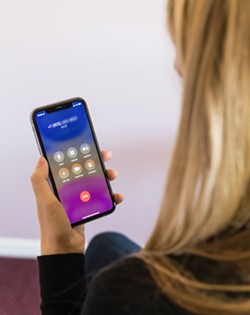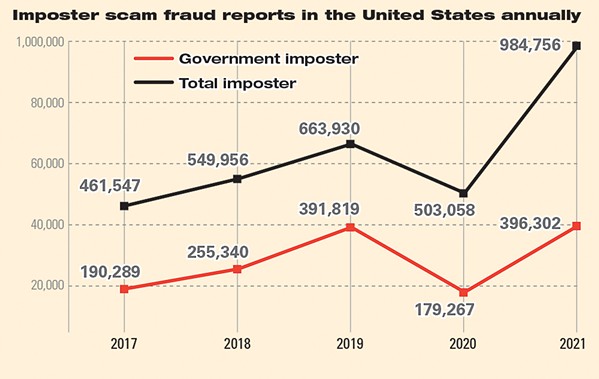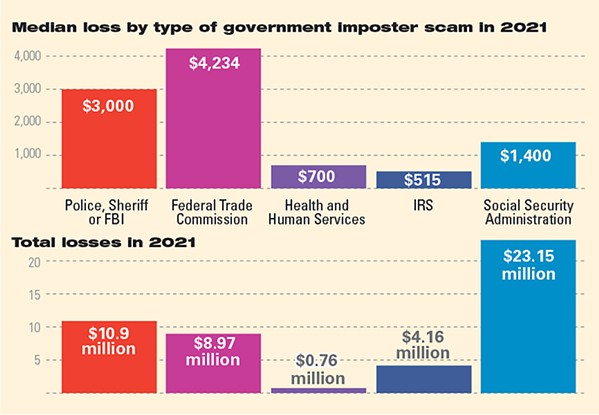The impersonator scam: Local therapist experiences the trauma of getting scammed by professional fraudsters
By Malea Martin[{
"name": "Ad - Medium Rectangle CC01 - 300x250",
"id": "AdMediumRectangleCC01300x250",
"class": "inlineCenter",
"insertPoint": "8",
"component": "2963441",
"requiredCountToDisplay": "12"
},{
"name": "Ad - Medium Rectangle LC01 - 300x250",
"id": "AdMediumRectangleCC01300x250",
"class": "inlineCenter",
"insertPoint": "18",
"component": "2963441",
"requiredCountToDisplay": "22"
},{
"name": "Ad - Medium Rectangle LC09 - 300x250",
"id": "AdMediumRectangleLC09300x250",
"class": "inlineCenter",
"insertPoint": "28",
"component": "3252660",
"requiredCountToDisplay": "32"
}]
She was in the car with her young daughter when her purple iPhone rang in December 2021.
"My father had just been diagnosed with stage 4 cancer, and it happened to be my mom's birthday," remembers Dr. Nicole Dolan, a mental health professional. "My daughter and I had just gotten a cake for her so that we could have dinner and celebrate."
She let the call go to voicemail. A man claiming to be Sgt. Jeff Nichols with the San Luis Obispo County Sheriff's Office left her a message saying he needed to speak with her about an important matter and told her to call back as soon as possible.
Immediately suspicious that it could be a scam, Dolan looked up Nichols' name and found that he was a real law enforcement officer in SLO County.
"I didn't call back the number that called me. The first thing that I did was call the SLO County Sheriff's [Office] directly," Dolan said. "I said, 'Hi, my name's Nicole Dolan. [Sgt.] Nichols is trying to get ahold of me. Can you put me through to him?'"
The person who answered the phone at the Sheriff's Office told Dolan that Nichols was out responding to an incident and that he would call her back.
"Within the next 15 to 20 minutes, when I'm waiting for the real officer Nichols to call me back, the fraudulent one called," Dolan said. "So I answer the phone, and thought, 'OK, well I guess this is legit.'"
Dolan never thought she'd fall victim to a scam call. But what she didn't realize at the time was that she was in the middle of one. The scammer held her hostage on the phone for hours and slowly wore her down emotionally, making her so desperate for it to be over that she'd do almost anything for it to end—and she did.
Ultimately, Dolan gave the fraudster thousands of dollars. Traumatized, she's still grappling with the emotional consequences of the extortion, and she doesn't want others to endure what she went through.
The call
The man on the phone claiming to be Sgt. Nichols knew Dolan's name, profession, and where she lived. He said she had failed to appear in court to testify on behalf of one of her clients, and as a result, there was a warrant out for her arrest.
"They said that they made two or three attempts at my home and at each of my offices to serve a subpoena to me, and because I missed that subpoena to show up in court to testify for a minor client of mine, there was a warrant for my arrest for failure to appear and contempt of court," Dolan said.
Testifying in court for a patient is something that mental health professionals like Dolan have to do from time to time—which made the scammer's claims seem all the more legitimate.
"In my field, that is the one thing that we are taught when we're in school to be deathly afraid of," she said. "Not showing up for a subpoena, for a court appearance."
After spending about an hour speaking in heavy police jargon, reading Dolan her rights, and explaining the nature of the warrant, the impersonator began to employ fear tactics.
"They went into this whole elaborate story about how the woman downstairs in my office actually may have signed for me, and I needed to make a decision if I wanted to press criminal charges against her or not," Dolan said. "I was really freaked out by that because the lady downstairs is my landlord, so I became really worried."
The scammer told Dolan that she needed to come down to the San Luis Obispo Sheriff's Office right away to take a handwriting test and prove it wasn't her signature.
"They told me at that point that I was basically under arrest," she said.
Her body shook with fear, she said, and her daughter, who was still in the car with her, was terrified.
"My child is freaking out, and I'm like, 'It's OK honey, everything's going to be OK,'" Dolan remembered. "So I have to come home and drop my child off."
As she drove to her home in Orcutt, the scammer threatened her, saying that if Dolan ended the call, they would come and arrest her. They also told her there was a gag order, so she wasn't allowed to talk to anybody about what was going on.
"I leave my house, and it's about a 45 minute drive to SLO," Dolan said. "I was pretty concerned at this point. I believed that I was going to go to jail. But afterwards, I realized I was also afraid for my life."
The extortion
The scammer told Dolan to drive to the Sheriff's Office, but as she drove, the impersonator started laying the foundation to take Dolan's money.
"They proceed to tell me that now they need money from me because there's a warrant for my arrest, and if I don't clear my warrant, then when I show up on the premises of the police station, they have no choice but to arrest me," Dolan said.
As soon as money was brought up, Dolan told the caller that she believed he was scamming her. But by then, she had been on the phone for close to two and a half hours. She was emotionally exhausted and worn down—exactly where the fraudster wanted her.
"He had a very police response to that, and then he asked me at the end of his lecture if I wanted to talk to his partner," Dolan said. "I remember at that moment feeling surrender come over my body. I had cortisol pumping through my body, I couldn't even make decisions anymore. When he offered for me to talk to his partner, it just scared me so much that I gave him the numbers that he wanted. I gave him $5,000."
After giving the scammer the money, Dolan hung up and called the Sheriff's Office again.
"I just demanded to speak to Officer Nichols," Dolan said.
The moment he said hello, she knew she had been scammed. The real Sgt. Nichols' voice was completely different from the man who had tormented her for the previous two and a half hours.
"I just started crying and shaking, telling him what happened," Dolan recalled.
Meanwhile, "I was getting text messages from the perpetrator saying, 'I know where you live, don't report it.' [Nichols] told me specifically what to say: 'I've contacted Officer Nichols at the SLO County Sheriff's Department, here's his badge number.' As soon as I did that, I didn't hear from them again."
Nichols told New Times that this was the first time he's had his name used in an impersonation scam, but it's happened to his colleagues before.
"I remember this incident specifically because I recall my dispatch telling me somebody had called," Nichols said. "I was able to touch base with her, and she was relieved to find out that no, she wasn't in trouble. Unfortunately, she had already been victimized."
But for Dolan, what was harder than losing the money was the trauma she carried after the incident.
"When it first happened, I was horribly upset," she said. "But I was also really angry because I recognized I had been traumatized. I have a trauma history, and I work with trauma, so it felt really upsetting to know that somebody who really just wanted my money had that large of an impact on my psyche."
Not alone
As a licensed psychotherapist who specializes in a trauma-informed approach to therapy, Dolan knows what the stages of trauma look like.
Dolan's Pismo Beach office is serene. At the entrance, a white-noise machine plays the soothing sound of rushing water. The walls are painted a calming shade of purple, and a velvet couch gives her clients a comfortable place to sink into as they unpack their trauma. Dolan is used to facing that couch, equipping people with the tools they need to cope with what they're going through.
But this time, "I watched myself go through that experience," Dolan said. "I knew how shattered my mind was afterward, my feeling of safety in my body and even in my home. I had so much control over my life at this point. So feeling like something like that could happen felt really unnerving."
Dolan soon discovered that she isn't alone. As she processed what happened, she reached out to fellow health professionals and found just how pervasive this scam is in her industry.
"The first person who I reached out to had gone through this ... [in Roseville], two months previous to me," Dolan said. "Even when I made the police report that night they said, 'Oh yeah, this happened to a nurse yesterday.'"
In the weeks after the call, Dolan connected with mental health professionals, nurses, and doctors from California to Pennsylvania who had experienced an almost identical scam.
Jaclyn Woods, a licensed marriage and family therapist in San Luis Obispo, received the call more than a year before Dolan did.
"A police officer called me, and when I looked him up he had the same name, badge number, and everything. He said he had a warrant out for my arrest," Woods recalled. "I kept being like, 'Is this a scam?' Then he got really aggressive, and said I needed to come down to the police station. So I thought, if I'm driving down there it's probably not a scam."
Luckily, Woods was with her boyfriend, who was able to contact the real police on his phone and ask if there was a warrant out for Woods' arrest.
"They said no, and this is potentially a scam," Woods said. "Then I basically told the guy, I know what you're doing, and hung up the phone."
Despite not losing any money, Woods was still traumatized by the experience.
"I cried a lot, and went through a whole kind of release [of] anger," she said. "I felt violated."
'Like psychological warfare'
For both Dolan and Woods, connecting with other people who have gone through it has not only helped them heal, but also affirmed that there's nothing shameful about falling victim to this crime. It can happen to anyone.
"I think there is a narrative out there of, if you get scammed, you're dumb," Woods said. "But this is actually really serious. It's like psychological warfare, the way they twist you up into this."
Santa Barbara County Deputy District Attorney Vicki Johnson runs a fraud hotline for Central Coast scam victims at (805) 568-2442. She said the people who call her come from all ages and backgrounds—and statistically, young adults are actually at higher risk.
According to Federal Trade Commission data, younger adults are more likely to lose money to fraud than older adults. In 2021, people ages 30 to 39 were the most likely of any age group to be scammed out of money in a fraud scheme.
"We have this myth that people who get scammed are somehow more vulnerable, they're elderly, they have cognitive issues, they're not very well-educated, on and on," Johnson said. "In my experience, most of these people do not fit that profile. Most of these people are educated, they're smart, they're professionals. And they always start the conversation by saying, 'I can't believe I fell for this.'"
Johnson said the specific scam that Dolan and Woods experienced has been "particularly pervasive lately" locally.
"It seems to target mental health workers because they're the people that can get subpoenaed to testify in their patients' cases," Johnson said. "So the scammers are already starting off with a viable premise."
Fraudsters do extensive research ahead of time about the person they plan to victimize, and in this case, the law enforcement officer they impersonate.
"What I don't think people understand is that this is a huge business, a multi-billion-dollar industry in the United States," Johnson said. "But it doesn't start here. Most of these scammers are [foreign] ... so local jurisdictions can't prosecute these folks because we don't have the ability to track them down or arrest them."
The pandemic gave scammers new ways to defraud people, "present[ing] criminal opportunities on a scale likely to dwarf anything seen before," the FBI National Press Office warned in April 2020.
"Most of these scams are scams of opportunity," Johnson said. "For example, as soon as the scammers realized the government was going to start issuing [stimulus] checks, these scams started, and they started before the first check was even issued."
Dolan's scammer leaned on COVID-19 to legitimize his claims.
"He said due to COVID, this is actually a courtesy of him, not to just show up at my house," Dolan remembers. "He said, 'Because you have a clean record, we are calling you as opposed to just coming to arrest you.'"
Federal Trade Commission data shows that imposter scams specifically have skyrocketed since the pandemic began. In 2019, about 664,000 imposter scams were reported in the United States. That number jumped to nearly 1 million in 2021.
"'We can't meet you in person because of COVID' is a very convenient excuse for scammers who are always hesitant to meet somebody in real life because that would expose the scam," said John Breyault, a fraud expert with the National Consumers League and a director at fraud.org.
But the pandemic isn't the only reason scam calls are getting more advanced.
"In years past, scammers would do a technique called spray and pray," Breyault said. "They'd basically send out these calls to thousands of phones and hope that they get a single-digit percentage of people who actually respond, and that makes enough money for the scammers to continue the scam."
Now, because information is more readily available through the internet and social media, scammers are moving toward a different approach.
"We call it spearfishing," Breyault said. "Rather than casting a wide net, they're actually targeting one person."
Seeking justice
While local jurisdictions are largely powerless in prosecuting foreign scammers, other organizations have the resources.
"The FBI will go after these folks," Johnson said. "When there's enough information, the FBI will put together a task force, and they will work with law enforcement in other [countries] to close down some of these sites."
For scammers to get caught, victims must file a complaint with an organization like fraud.org or agencies like the Federal Trade Commission and the FBI.
"Those complaints, when viewed in the aggregate, can help law enforcement at the state level, at the federal level, build cases and put these criminals behind bars," Breyault said. "That's why we always encourage victims to file complaints."
But filing a complaint won't get victims their money back.
"The problem is, once the money gets sent, because of loopholes in our consumer protection laws, it's very difficult for the consumer to get the money back," Breyault said. "That's why groups like mine are working with Congress and with the Consumer Financial Protection Bureau to try and change the law, so that when people are induced to send money through fraud, that they're able to get the money back."
Groups like the National Consumers League are working to amend the Electronic Fund Transfer Act, which was passed to protect consumers from losing money when someone steals their debit or credit card and runs up charges.
"Unfortunately, that law does not currently apply to cases where you were induced to send the money through fraud," Breyault said. "The bank is under no obligation to refund you the money. ... We're hopeful that with continued advocacy, we'll get to a point where we can help make victims whole."
As much as Dolan would be happy to get her $5,000 back, she lost more than money that day—and she's passionate about making sure it doesn't happen to anybody else.
"I don't even care about the money. [It's] the impact of trauma," she said. "But they messed with the wrong person. ... As a victim of this experience, it's really upsetting to think that it's been going on for years. I'll spread this as far and wide as I can, and hopefully stop it." Δ
Reach Staff Writer Malea Martin at [email protected].
Latest in News
Readers also liked…
-

Coast Unified teachers upset over new position's salary and qualifications
Oct 20, 2022 -

SLO police identify alleged driver who hit and killed couple
Dec 22, 2022 -

When the levee breaks: Oceano residents, county officials walk a tightrope of regulations to manage Arroyo Grande Creek, which some say led to the levee's failure in January
May 18, 2023














